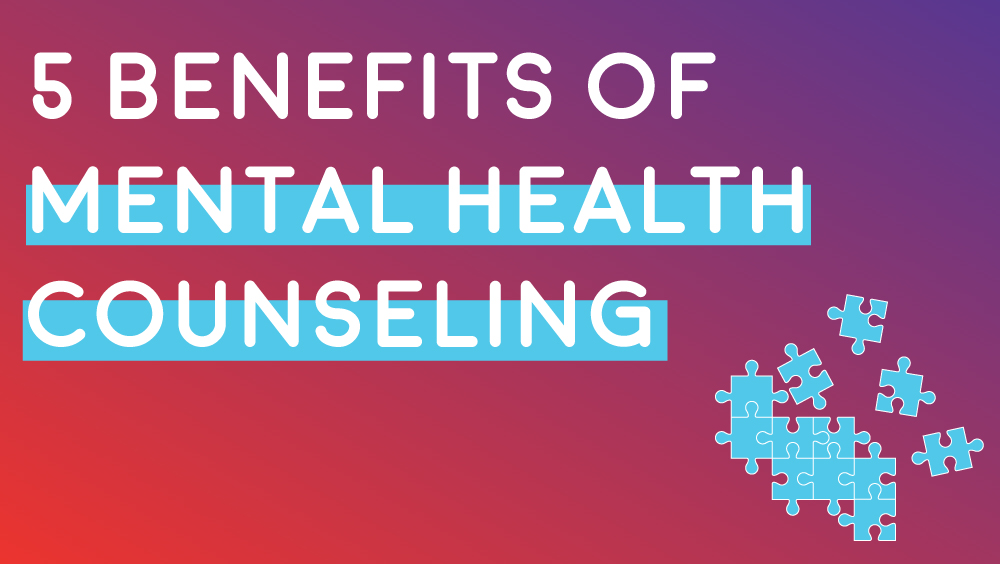What Does Mental Health Counseling Mean?
Wiki Article
The 9-Second Trick For Mental Health Counseling
Table of ContentsThe Mental Health Counseling DiariesThe Only Guide for Mental Health CounselingLittle Known Facts About Mental Health Counseling.The Single Strategy To Use For Mental Health CounselingLittle Known Facts About Mental Health Counseling.
Via therapy, you can acquire insight into your own patterns of habits and communication, which can bring about even more satisfying and satisfying connections with friends, household, and enchanting partners. What we think, we manifest. If you're consumed with negative feelings and unfavorable ideas that are disrupting your life, therapy can aid., or there are various other unfavorable methods you behave. Treatment can assist you alter those habits that are having a negative effect on your globe and relationships.

Obtaining treatment to resolve specific elements of your life can assist you be extra effective in various other areas, including work.

The Facts About Mental Health Counseling Uncovered
You can see a specialist when things are going truly well in your life, or when you will experience a big life change." Talkspace specialist Kate Rosenblatt, MA, LPC, LMHC. There are also a lot more advantages of treatment than simply the ones we have actually discussed. Therapy can instruct you exactly how to take care of separation, take care of pain, or construct partnerships (enchanting or those with family or good friends) in a healthy and balanced means.For the objective of the existing research, viewed benefits and barriers to mental health help-seeking are being discovered. Previous study located that regarded barriers have a significant result on college students' health and wellness habits choices (Von Ah, Ebert, Ngamvitroj, Park & Kang, 2003). Viewed benefits and barriers to help-seeking were particularly picked because of their influence on decision-making and eventually activity (Glanz, Rimer, & Su, 2005).
Today study seeks to examine whether stigma serves as an obstacle to treatment amongst university student. Eisenberg et al. (2011) recommended that suspicion about therapy efficiency is one more barrier to joining treatment. Research study findings disclosed that college students supported several obstacles to taking part in therapy. Mental Health Counseling. Among these were: (1) favoring to handle mental wellness troubles themselves, (2) not having sufficient time to take part in therapy, (3) questions about whether psychological health and wellness therapy works in remediating problems, (4) a belief that stress and anxiety is typical or the trouble will obtain far better without treatment, (5) absence of cash, and (6) fret about what others would believe if they discovered therapy involvement.
Staff in university psychological wellness centers may be viewed as hostile, and long wait times for services may be "repulsive" for trainees. Variables facilitating extra favorable perspectives are usually at the opposite pole of those elements determined as obstacles.
The Main Principles Of Mental Health Counseling
One in 3 (34.6%) reported residing on campus and one in four (23.3%) reported coping with parents. check it out Nearly half of pupils were associated with campus companies and 1 in 10 reported remaining in a society or sorority. Greater than one-third of students (38.1%) reported that they had a relative or buddy with a detected mental health and wellness condition.

The Facts About Mental Health Counseling Uncovered
Univariate F-tests recognized particular subscale products that significantly differed. Women were much less likely than males to perceive individuals who most likely to therapy as psychologically weak, individuals that most likely to counseling as insane, to really feel that people with psychological illness need to More about the author handle issues on their very own, that individuals who most likely to counseling as not able to resolve troubles, that people that go to counseling are careless, and to feel that people that go to counseling are various from regular individuals in an adverse way.Similarly, research results exposed that females were significantly less likely than males to hold stigma-related perspectives. This follows previous study which likewise located that males hold greater degrees of viewed preconception than females (Chandra & Minkovitz, 2006). Based upon research searchings for, it appears that males might be less most likely than ladies to seek therapy because of low perceived barriers along with high stigma-related perspectives.
Mental Health Counseling - The Facts
In enhancement, university health and wellness professionals might use academic programs targeting males with info on the advantages of mental wellness treatment and the relevance of looking for aid when needed., the existing research found no considerable distinctions in the number of perceived barriers to help-seeking habits based on sex.Scientist guess that this is mainly due to standard social norms and gender roles that defined men based on toughness and absence of psychological expression (Addis & Mahalik, 2003; Ang, Lim, Tan, & Yau, 2004; Mojtabai, 2007). Generally, there have actually been you could try this out blended results amongst the university student populace pertaining to sex distinctions (Rosenthal & Wilson, 2008). This finding was unanticipated and could highlight that those that had obtained counseling had a better idea of delay times and various other "accessibility" barriers that might make it tough to start therapy. Perhaps, individuals that have received therapy view more obstacles than individuals who have not obtained counseling since seeking therapy services once more could involve worry of self-disclosing personal details to a brand-new counselor.
Report this wiki page